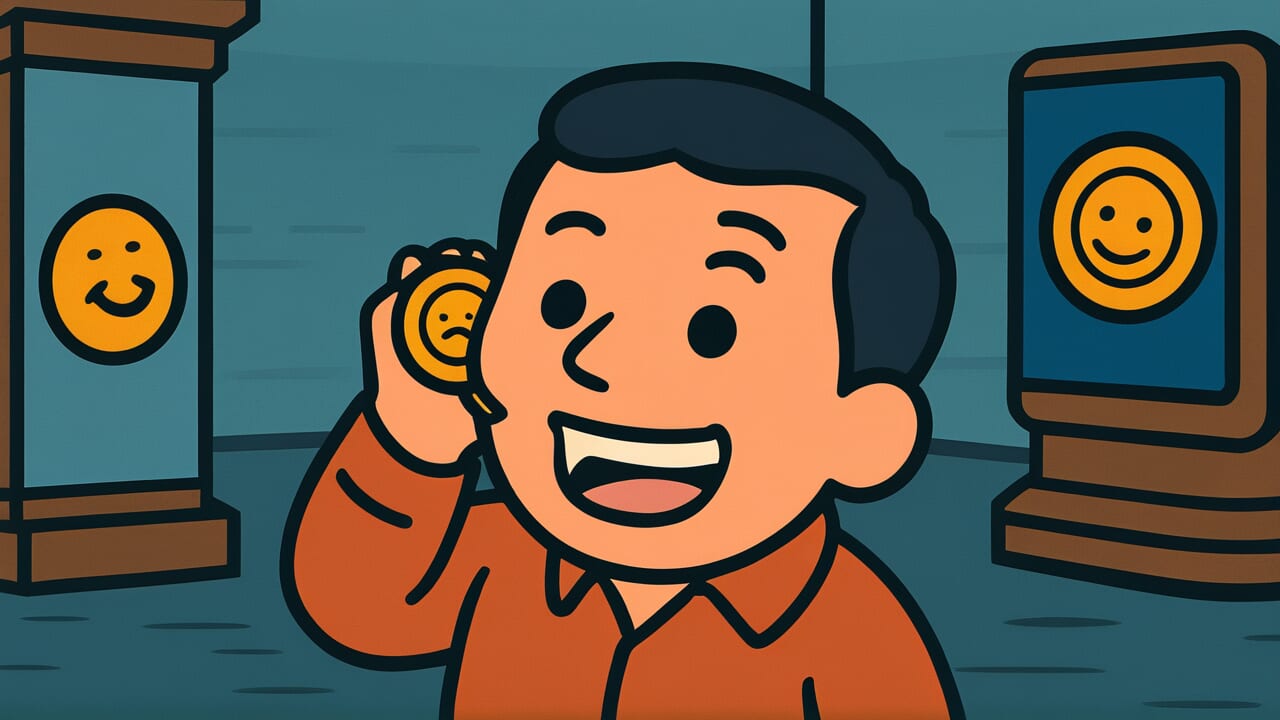How to Read “Those who laugh at one sen will cry over one sen”
Issen wo warau mono wa issen ni naku
Meaning of “Those who laugh at one sen will cry over one sen”
This proverb teaches that if you treat even small amounts of money carelessly, you will face trouble later.
People who laugh at just one sen because it seems so tiny will eventually cry when they need that one sen and don’t have it.
You can use this saying when warning someone who wastes money on small purchases without thinking.
It also works well when teaching the importance of saving money.
The proverb effectively shows how small daily choices add up to make big differences in the future.
This expression works so well because it vividly captures the importance of money sense.
The shift from “laughing” to “crying” clearly shows the journey from carelessness to regret.
Even today, many people share this experience. They spend small amounts without thinking, but those amounts pile up.
Before they know it, they have no savings left. This proverb points out this common human trap with simple, precise words.
Origin and Etymology
No clear written records explain the exact origin of this proverb.
However, people believe it has been widely used among common folk since the Edo period.
Looking at the unit “one sen” reveals an interesting background.
During the Edo period, one sen was indeed a small amount of money.
But for common people of that time, one sen held real significance.
A day’s wages might be only several dozen sen. With one sen, you could buy tofu or candy.
In other words, one sen had practical value directly connected to daily life.
The contrast between “laugh” and “cry” makes this proverb memorable.
It vividly shows two attitudes: laughing off small amounts as worthless, then crying later when you realize how much they add up.
This proverb likely emerged from merchant culture in prosperous cities like Edo and Osaka.
In daily business, people witnessed how those who valued small coins succeeded while those who dismissed them failed.
This life wisdom crystallized into these simple, striking words.
Usage Examples
- I bought juice at the convenience store every day, and just like “those who laugh at one sen will cry over one sen,” my wallet was empty by month’s end
- Since “those who laugh at one sen will cry over one sen,” I’ll put even this 100 yen into my piggy bank instead of wasting it
Universal Wisdom
This proverb has survived because it addresses a fundamental human cognitive bias.
We tend to underestimate small things and overestimate large things.
One sen seems trivial when it’s right in front of you. But add the element of time, and those small amounts accumulate into large sums.
Why do people dismiss small amounts of money? Because our brains struggle to grasp the impact of individual actions.
Today’s one sen, tomorrow’s one sen—each one is truly small. But look ahead one year, ten years, and the accumulation becomes significant.
This proverb reveals the magic of time. Small choices, when repeated, shape your entire life.
Valuing one sen isn’t about being cheap. It’s about having the wisdom to see the future and understand the weight of each moment’s choices.
Our ancestors knew that humans easily get caught up in immediate concerns.
That’s why they used the dramatic contrast of “laugh” and “cry” to sound an alarm for us.
This proverb brilliantly captures a life truth: dismissing small things leads to big regrets.
When AI Hears This
Why does treating one sen carelessly create such big differences later?
This is exactly what complexity science calls “sensitive dependence on initial conditions.”
Tiny differences at the start create unpredictably large differences over time.
Consider two habits: wasting 100 yen carelessly versus valuing it. The difference is just 100 yen.
But human behavior involves “feedback loops.” Once you dismiss 100 yen, you’re more likely to dismiss it again.
Your brain learns that behavior pattern. The same reinforcement happens when you value money.
Continue this pattern for one year, five years, ten years, and the difference becomes impossible to calculate with simple multiplication.
Even more interesting is how this small habit of handling money spreads to completely different areas.
It affects work quality, relationships, and health management.
In complex systems, changes in one part create unexpected effects elsewhere.
Laughing at one sen isn’t just about money sense. It signals a lack of attention to everything.
Meteorologist Lorenz discovered the butterfly effect: a butterfly’s wings in Beijing could cause a storm in New York.
One sen is “a butterfly’s wings in the economic system.” It can summon unpredictable storms in the complex system of your life.
This proverb warns us of that danger.
Lessons for Today
This proverb teaches you a truth: small choices accumulate to create your life.
This isn’t just about money. Ten minutes of daily study, one word of gratitude each day, small acts of kindness—all these build up to shape who you are.
Modern society tends to focus only on big success and dramatic changes.
But what truly transforms your life are humble, small daily habits.
Valuing one sen means valuing this present moment.
Try starting by recording your small daily expenses. Use a smartphone app or a handwritten notebook—either works.
When you see where your money goes, you’ll notice unconscious waste.
That awareness applies to how you use your time and energy too.
What matters is not dismissing small things. Don’t laugh at one sen—be grateful for it.
This attitude will eventually bring richness to your life.



Comments